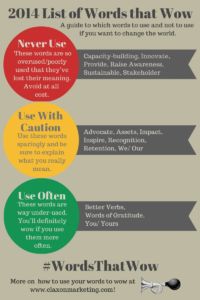[This is the latest post in our #WordsThatWow series.]
We. It seems like such a nice word, doesn’t it? Like a big hug. Only it’s a word. A word-hug, as it were. Ditto for ‘our’.
“We are creating opportunities for girls across our state.”
‘We’ implies we’re all in this together. Working hard to make our state a better place. That’s a good thing, isn’t it? Yes, it is, but here’s the thing: often ‘we’ aren’t all in this together.
“We’re putting an end to human trafficking.”
“We make sure every kid can become a great reader.”
“We feed our neighbors.”
When you read those sentences, to whom is the ‘we’ referring? That’s right, the organization. And this where ‘we’ goes awry. It’s not about you and your organization. It’s about the people you serve and the people who make it possible.
Often, when using the word “we”, nonprofits actually alienate the very people they want to include. We, us, our and ours (a.k.a. first person plural pronouns) quickly become an exclusive group, with the organization on the inside and donors, volunteers, supporters looking in. (Hence the cliché “us versus them”.)
The good news is: It doesn’t have to be this way. You can use these first person pronouns as a tool to include everyone who plays a part in helping your organization meet its mission.
Check out the phrases Tessa, our word-erific intern, used in a recent thank you letter:
“We appreciate your commitment to a sustainable future. Together, we will create a world free of environmental injustice.”
Did you catch which “we” was referring to the organization’s staff, and which was including the donor? It’s the same word, but the distinction is in the context.
This is why we, us, our and ours can certainly be used, but should be used with caution. Sometimes, they can be powerful tools to make others feel involved in your cause. But other times, they can make people feel separate from your cause. Pay attention to your context.
We appreciate you reading our blog post. By learning more about language, we can better achieve our missions. (Get it?!)
